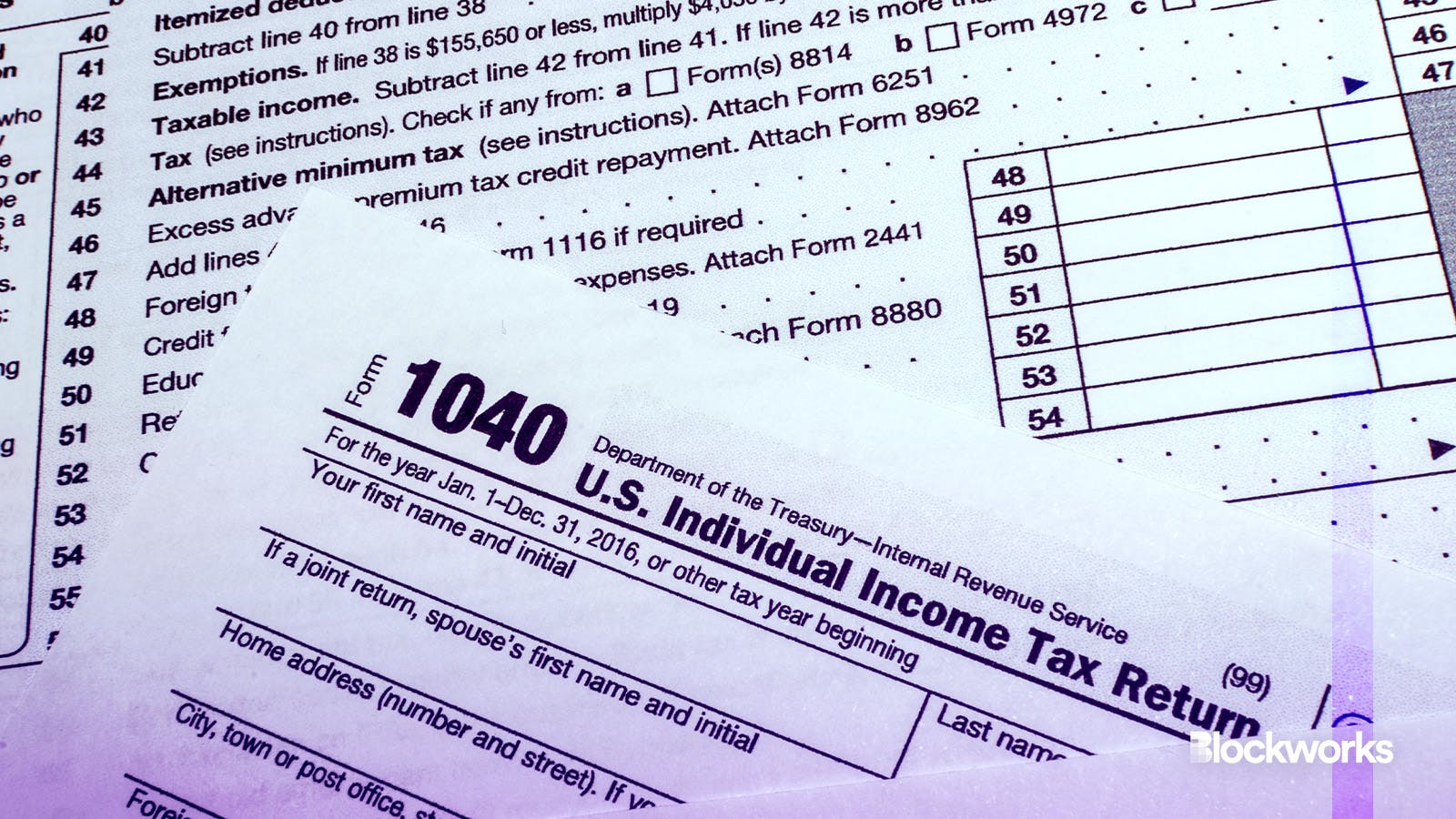It’s time for the taxman, report these 5 crypto events
Selling and trading cryptocurrencies will trigger a taxable event

David S Swierczek/Shutterstock modified by Blockworks
Tax season in the United States is just around the corner, and cryptocurrency holders must report their crypto gains and losses.
According to Shehan Chandrasekera, the head of tax strategy at CoinTracker, there are five taxable events that cryptocurrency holders should be aware of.
The first and most obvious one, Chandrasekera notes, is if a user cashes out their crypto holdings.
“If you bought bitcoin for $10,000 and cashed it out for $50,000, you have a capital gain event of $40,000 in taxes,” he said.
In this example, the $40,000 gain represents the increase in value from the user’s initial purchase price to the price at which they sold or exchanged the bitcoin. It is only this gain that is subject to capital gains taxes, not the entire $50,000 amount the user received.
Read more: Crypto tax evasion cases are on the rise: Bloomberg
Another taxable event would be when one coin is converted to another coin. In this particular case, if a user purchases bitcoin for $10,000, and after it is worth $50,000 they sold it for ether, they would be required to pay taxes in US dollars.
In the past, some argued that swapping one cryptocurrency for another could be seen as a like-kind exchange under Section 1031 of the Internal Revenue Code, allowing people to delay paying taxes on profits if they traded similar kinds of property. But, the Tax Cuts and Jobs Act of 2017 changed the rules, limiting like-kind exchanges strictly to real estate. As a result, even though trading cryptocurrencies might seem similar, these transactions don’t qualify as like-kind exchanges and must be reported as taxable events.
“A lot of people don’t realize that when you convert one coin to another, it triggers a taxable event even though you’re not cashing out,” Chandrasekera said.
The third taxable event is when crypto is used to purchase goods and services, like subscription services.
“That triggers a taxable gain if the coin has appreciated in value at the time you’re spending,” he said.
Conversely, if its value has decreased, the user will incur a loss. This gain or loss is what gets reported to the IRS, not just the act of spending the crypto.
The fourth taxable event is when you earn cryptocurrency through mining, staking or through employment wages. For mining and staking, the IRS considers the fair market value of the cryptocurrency at the time it’s successfully mined or earned as your income. This must be reported in the year it’s received, facing ordinary income taxes and potentially self-employment taxes if it’s business-related.
Similarly, if you’re paid in cryptocurrency for services rendered as part of your employment, the value of the cryptocurrency on the day you receive it is considered your income. This amount is subject to federal and state income taxes, and it must be reported on the recipient’s tax return just like any other form of income.
The final taxable event is receiving cryptocurrency through airdrops, which Chandrasekera notes would be treated similarly to income. Similar to previously mentioned events, the IRS taxes airdrops at their fair market value at the moment the individual takes possession of the assets.
Chandrasekera notes that, unlike traditional exchanges, cryptocurrency exchanges do not calculate capital gains and losses for their users, which means it will be down to the individual taxpayer to determine what their taxable income would be.
Crypto holders can stay ahead of their reporting requirements by maintaining detailed records of any buying, selling, trading and usage activities, including dates, amounts in both cryptocurrency and US dollars, and the fair market value of any cryptocurrencies used at the time of each transaction.
Read more: Who’s affected by new crypto tax reporting obligations in the US?
According to Chandrasekera, there is currently no threshold for reporting cryptocurrency earnings. This means that even if a trader were to make a few dollars through trades, they would be required to report it.
The Internal Revenue Service has, however, recently passed a law that requires businesses and professional traders that receive over $10,000 worth of cryptocurrencies to report their transactions, charging those who fail to comply with felony offenses.
Though this is the case, very little clarification has been given about what is considered a business transaction and what is not, and the IRS has said that businesses can temporarily hold off on their reporting obligations until further notice is given.
Get the news in your inbox. Explore Blockworks newsletters:
- The Breakdown: Decoding crypto and the markets. Daily.
- 0xResearch: Alpha in your inbox. Think like an analyst.






